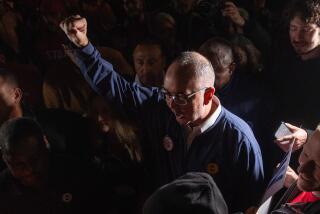German Labor Union Wins 4% Pay Raise in Settlement; Strike Credited : Europe: Accord and the strengthening mark could hinder nation’s efforts to become more competitive.
- Share via
BONN — As currency traders flocked to the German mark Tuesday, Germany’s powerful IG Metall trade union and the country’s leading automobile, electronics and engineering firms reached a hard-fought deal for a 4% pay raise and an end to the union’s first strike in 11 years.
Although the union had demanded a 6% pay hike, the increase was much higher than many observers had expected. Many economists said the pay hike, coupled with the strong mark, will hurt the country’s exports and lead to a slowing of its economic recovery.
Labor leaders credited the 12-day strike in the southern state of Bavaria for the two-year accord, which sets the standard for wage negotiations in other industries throughout Europe’s largest economy.
“The strike was worthwhile,” said a satisfied Klaus Zwickel, chief of the 3 million-member union.
But industry leaders and business analysts consider the agreement--whose terms include a 35-hour workweek after Oct. 1--a serious setback to Germany’s efforts to become more competitive in international markets. The mark soared to an all-time high Tuesday against the dollar, making German exports more expensive.
Economists predicted an initial expansion in demand and then a move by Germany’s inflation-wary central bank to increase interest rates, which would slow economic growth. They said the high wages mean the current high level of unemployment--9.9% nationwide, which had been seen as a temporary result of the recession--will remain a permanent fixture.
“This is actually quite a bad outcome,” said Joachim Fels, an economist at Goldman Sachs in Frankfurt. “This wage deal will harm the economy going into 1996.”
The accord, reached after a 19-hour overnight bargaining session, gives workers a monthly payment of about $109 from January through April and a pay raise of 3.4% in May. A second pay raise of 3.6% will go into effect in November. The contract runs until Dec. 31, 1996.
The deal averages out to 4% for the year. But the package also includes previously negotiated increases in Christmas bonuses and the cut in the workweek to 35 hours from 36, which add to labor costs.
German wages are among the highest in the world. Following a sharp recession in 1993, German unions last year accepted a 2% increase, which business leaders had hoped was the beginning of a readjustment.
Now, Fels said, “it’s clear there was no structural change.”
Union leaders counter that the two-year accord provides stability in the industry. High wages have traditionally bought calm and cooperation from German labor.
The 21,000 union members on strike in Bavaria since Feb. 24 are expected to approve the wage deal in a vote today or Thursday and are likely to be back at work by Monday.
During negotiations, union leaders had threatened to spread the strike nationwide, while employers resisted the shortened workweek, saying Germans already work too little.
Before this, there had not been a strike in the western German metals industries since 1984. That strike spread nationwide and lasted six weeks, hitting the auto industry particularly hard.
More to Read
Sign up for Essential California
The most important California stories and recommendations in your inbox every morning.
You may occasionally receive promotional content from the Los Angeles Times.










